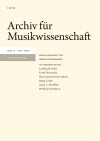
ARCHIV FUR MUSIKWISSENSCHAFT
Scope & Guideline
Bridging Tradition and Modernity in Musicology
Introduction
Aims and Scopes
- Historical Musicology:
The journal focuses on the historical development of music, exploring composers, musical works, and their contexts, often delving into specific time periods or geographical regions. - Cultural and Political Contexts of Music:
Research often addresses how music interacts with cultural and political dynamics, examining the implications of music in various societal frameworks. - Analytical Methodologies:
The journal publishes studies that employ a range of analytical techniques, including semantic analysis, hermeneutics, and computational methods to dissect musical compositions and their structures. - Interdisciplinary Approaches:
Contributions often draw from various academic disciplines, including philosophy, literature, and cultural studies, providing a comprehensive view of music's role and significance. - Reception Studies:
The journal frequently engages with how music has been received historically and in contemporary contexts, examining critiques, adaptations, and transformations of musical works.
Trending and Emerging
- Intersections of Music and Politics:
There is an increasing focus on the political dimensions of music, exploring how musical works reflect, resist, or engage with political ideologies and movements, as seen in recent studies of operas and compositions. - Posthumanism and Music:
Emerging discussions around posthumanism in music, particularly in relation to film scores and contemporary compositions, indicate a shift towards understanding music's role in a technologically mediated world. - Cross-Modal and Multisensory Analysis:
Research that examines music's interaction with other art forms and sensory experiences is gaining traction, highlighting the interdisciplinary nature of contemporary music studies. - Global Perspectives on Music:
The journal is increasingly publishing works that incorporate global perspectives, examining non-Western musical traditions and their influences on Western music, reflecting a broader inclusivity in musicological research. - Digital Humanities in Musicology:
The application of digital tools and methodologies in musicology is on the rise, with studies utilizing software for analysis and archiving, demonstrating an integration of technology in music research.
Declining or Waning
- Traditional Music Theory:
There seems to be a reduced emphasis on conventional music theory topics, with fewer papers analyzing harmonic structures or traditional compositional techniques in isolation. - Focus on Early Music:
Research concerning early music, particularly pre-Baroque traditions, has decreased, possibly overshadowed by a growing interest in contemporary and modern repertoires. - Narrow Biographical Studies:
Papers that focus solely on the biographies of individual composers, without broader contextual analysis, are being published less frequently, indicating a shift towards more integrative approaches. - Regional Studies with Limited Scope:
While regional studies have been a staple, there appears to be a decline in works that focus narrowly on specific locales or traditions without connecting to wider themes or global contexts. - Historical Performance Practices:
The exploration of historical performance practices is less prevalent, suggesting a shift towards more theoretical and analytical articles rather than practical applications of performance.
Similar Journals

Muzikoloski Zbornik
Exploring the Depths of Musical HeritageMuzikoloski Zbornik is a prominent open-access journal in the field of musicology, published by the esteemed University of Ljubljana Press since 1965. Hailing from Slovenia, this journal has been dedicated to advancing the study of musical heritage, theory, and practice, serving as a vital platform for researchers, professionals, and students alike. With a notable Q2 category ranking in the field of music and a Scopus ranking of 109 out of 180 in Arts and Humanities, Muzikoloski Zbornik showcases high-quality research, fostering discourse and collaboration among scholars globally. The journal embraces a diverse range of topics, from ethnomusicology to music education, ensuring its relevance in an ever-evolving academic landscape. By providing unrestricted access to its content, it champions the dissemination of knowledge and supports the growth of the musicology discipline.
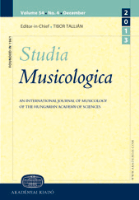
Studia Musicologica
Unveiling the Rich Tapestry of Music's HistoryStudia Musicologica, published by AKADEMIAI KIADO ZRT, stands as a leading journal in the field of musicology, dedicated to the exploration and analysis of music across diverse cultures and historical contexts. With its ISSN 1788-6244 and E-ISSN 1789-2422, this journal provides an essential platform for disseminating high-quality research and critical analyses, thereby contributing significantly to scholarly discourse in music studies. Although it operates on a traditional access model, its rigor and foundational contributions ensure that it remains invaluable for researchers, professionals, and students alike. Situated in the heart of Hungary, Studia Musicologica engages with a broad spectrum of topics including music theory, ethnomusicology, and music history, fostering a deeper understanding of music's multifaceted role in society. This makes it an essential resource for anyone interested in advancing their research or professional practice within the expansive field of musicology.

REVUE DE MUSICOLOGIE
Illuminating the Historical Pathways of MusicREVUE DE MUSICOLOGIE is a prominent academic journal dedicated to the diverse field of musicology, published by EDITIONS TRANSATLANTIQUES in France. With an ISSN of 0035-1601, this journal has been a key platform for researchers and scholars since its inception, fostering scholarly discourse and advancing the understanding of music's cultural, theoretical, and historical dimensions. Although it currently holds a Q4 category in Music according to the 2023 quartiles and is ranked #140 in the Scopus Arts and Humanities Music category, REVUE DE MUSICOLOGIE continues to publish valuable insights that contribute to the global musicological landscape. The journal does not offer open access, adhering to standard subscription models. Its primary objective is to provide a rigorous forum for original research articles, reviews, and theoretical discussions, making it an essential resource for academics, professionals, and students in the field of musicology. Located at 50 RUE JOSEPH DE MAISTRE, 75018 PARIS, FRANCE, it promises to remain a vital part of music research through 2023 and beyond.
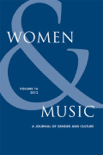
Women and Music-A Journal of Gender and Culture
Celebrating the Rich Tapestry of Women in MusicWomen and Music: A Journal of Gender and Culture is a pioneering academic journal published by University of Nebraska Press, focusing on the intersection of gender and music. With a commitment to exploring issues pertinent to women and music in a range of cultural contexts, this journal provides a critical platform for scholars, musicians, and educators to share research that enriches our understanding of gender dynamics within the music industry and music's role in society. While currently not an open-access journal, it aims to make significant contributions to gender studies, cultural studies, and musicology, attracting a dedicated readership from various backgrounds. The journal is essential for those interested in feminist musicology and gender representation in the arts, fostering discourse that challenges traditional narratives and promotes inclusive scholarship. By bringing together diverse perspectives and innovative research, Women and Music continues to push boundaries and foster important conversations within both academic and artistic communities.
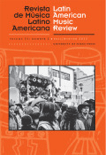
LATIN AMERICAN MUSIC REVIEW-REVISTA DE MUSICA LATINOAMERICANA
Fostering Critical Insights into Latin America's Musical LandscapeLATIN AMERICAN MUSIC REVIEW-REVISTA DE MUSICA LATINOAMERICANA stands as a prominent scholarly journal dedicated to the profound and diverse traditions of Latin American music. Published by University of Texas Press, this journal offers a platform for critical analysis, innovative research, and the dissemination of knowledge concerning the rich cultural heritage of Latin America. Although it currently does not provide open access options, the journal has made significant contributions to the field since its establishment, engaging a wide array of interdisciplinary perspectives. With coverage spanning from 2002 to 2009, the journal has been central to fostering scholarly dialogue and expanding the academic understanding of Latin American musicology, serving as an essential resource for researchers, professionals, and students alike. The journal is vital for those exploring the intersections of music, culture, and identity within the vibrant landscapes of Latin America.

Problemy Muzykalnoi Nauki-Music Scholarship
Fostering Insight into Music's Socio-Cultural ImpactWelcome to Problemy Muzykalnoi Nauki-Music Scholarship, a leading journal in the field of music scholarship published by the esteemed Gnesin Russian Academy of Music. With an ISSN of 2782-358X and an E-ISSN of 2782-3598, this Open Access journal has been committed to the dissemination of high-quality research since 2009, making scholarly work accessible to a global audience. Covering diverse aspects of music theory, history, and its socio-cultural impacts, Problemy Muzykalnoi Nauki serves as an essential platform for scholars, educators, and practitioners in the arts and humanities, as well as in social sciences related to music education. While its Scopus coverage was discontinued in 2021, the journal remains influential, holding a rank of #48 in the Arts and Humanities category and a percentile of 67th, showcasing its relevance and rigor in the discipline. We invite researchers and students alike to explore the rich contributions made within these pages, fostering a deeper understanding and appreciation of music in contemporary society.
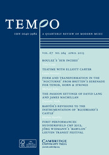
TEMPO
Pioneering Critical Conversations in Music ResearchTEMPO, a renowned journal published by Cambridge University Press, is dedicated to the expansive field of music studies. With its rich history dating back to 1939, the journal has significantly evolved, offering researchers, professionals, and students a platform to explore diverse musical perspectives and innovations. Serving as a vital resource in its category, TEMPO is currently positioned in the Q2 quartile within the field of Music, reflecting its quality and academic influence. Although it operates under a traditional subscription model, its impactful contributions to music scholarship are underscored by its active engagement with contemporary issues in musicology, performance, and education. Researchers can rely on TEMPO for cutting-edge analyses, reviews, and critical discourse that shape the understanding of music in society.
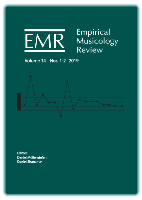
Empirical Musicology Review
Advancing Interdisciplinary Insights into Music StudiesEmpirical Musicology Review is a pioneering journal in the field of musicology, published by the Ohio State University School of Music. Established as an open access journal since 2006, it aims to foster interdisciplinary research by providing a platform for scholars to disseminate empirical studies and analyses related to music. With ISSN 1559-5749, this journal plays a crucial role in expanding the understanding of music through methodological rigor and innovative practices, catering to researchers, professionals, and students alike. By promoting the accessibility of high-quality research, Empirical Musicology Review significantly contributes to the evolving landscape of music studies and enhances the global dialogue surrounding music's theoretical and practical dimensions. The journal's commitment to open access ensures that its valuable insights reach a broad audience, encouraging further exploration and collaboration within the musicology community.

Studia Universitatis Babes-Bolyai Musica
Advancing the Frontiers of Music ResearchStudia Universitatis Babes-Bolyai Musica is a prestigious academic journal dedicated to the field of musicology, published by UNIV BABES-BOLYAI. Since its inception, it has strived to foster scholarly communication and share groundbreaking research that spans various music-related disciplines, including ethnomusicology, music theory, and performance studies. The journal operates under an Open Access model since 2021, ensuring that its content is freely accessible to a global audience of researchers, professionals, and students interested in advancing their knowledge and understanding of music. By providing a platform for high-quality, peer-reviewed articles, Studia Universitatis Babes-Bolyai Musica plays a vital role in promoting significant contributions to the evolving discourse in music studies. Its commitment to intellectual rigor and openness aligns with contemporary academic trends, making it an essential resource in the realm of music research.

MUSIKTHEORIE
Exploring the Depths of Music TheoryMUSIKTHEORIE is a pivotal journal dedicated to the field of music theory, published by LAABER-VERLAG. With its ISSN 0177-4182, this journal serves as an essential platform for scholars, educators, and practitioners interested in the multifaceted dimensions of music theory. Although it does not currently offer open access, it provides in-depth analyses and critical discourse on theoretical frameworks, compositional techniques, and historical perspectives in music. Despite its coverage in Scopus being discontinued after 2018 and ranking within the 5th percentile of Arts and Humanities - Music, MUSIKTHEORIE remains a respected publication for advancing knowledge and fostering collaboration within the musicological community. Researchers and students alike can benefit from its rich content and the insights shared within its pages.